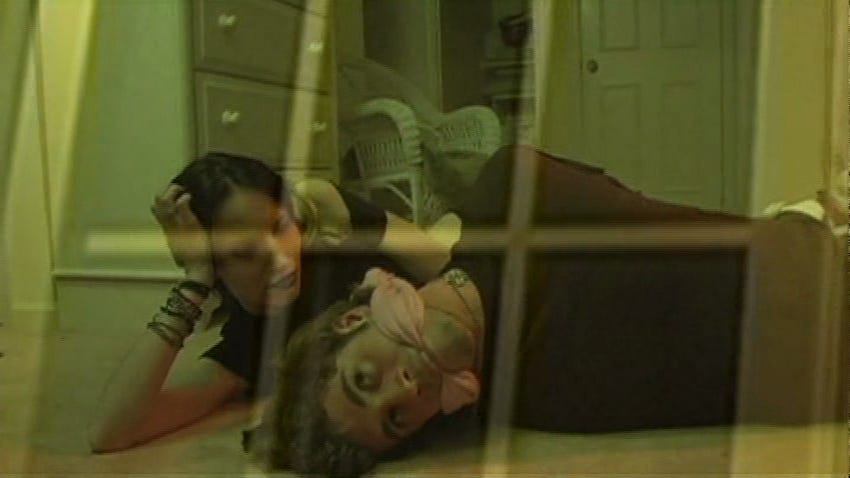Minor Horror #02-13: Almost Invisible
This is the thirteenth in a series of fifteen pieces on “minor” horror films that I’m going to be publishing here throughout October. For more information, please see this post from last year, when I first did this.
Almost Invisible (David Allingham, 2010)
“What’d she say about this door?”
“I dunno, something about it sucking you away into oblivion.”
Almost Invisible is a movie which is so absolutely confounding, simultaneously absolutely singular and totally generic, even conservative in nature, that it’s difficult to know where to start with it. I will describe one of its opening scenes, by way of example, because I don’t know how else but by example I could give you any sense of what it’s like to watch this thing: a guy rushes into a classroom seemingly just before it’s about to start. Slick, upbeat alt rock of no particular flavor is playing in the background, as it will be for much of the movie (all of it, i’m pretty sure, written by the director). He sits in the back corner and everyone turns around to look at him. This is communicated through rapid-fire POV shots where the camera swings around for different people to make aggressive eye contact with us. Immediately after this, with none of these people having yet been introduced as “characters” in any meaningful way, or any explanation of what sort of class this is, a TV at the front of the classroom starts playing a video of a blonde woman lying face down on a couch, completely naked. This video expands to fill the screen as the camera pans over her body a couple times. Then, there’s a knock at the door and she yells that it’s open, sounding annoyed. A man wearing just a pair of gray sweatpants comes in. He’s bleeding from the mouth and has deep, bloody slash marks in his chest and he’s walking like a zombie. He comes and stands in front of the woman and she starts screaming. On a closeup moving into her open mouth, the video fades to black, and the guy who just got there gets up to apparently answer questions about it (did he shoot it? Why? With whom? It’s unclear). No one asks any real questions, they all seemed to find the video really boring, but one guy asks how to spell “rectum” for some reason. This persists for a couple minutes, then the guy goes back to his seat, which in the interim a girl has put a pushpin on, point up. The guy sits down, yelps, and then the professor (played by Allingham, the director) dismisses the class, saying, “Remember, Friday, psychological trauma and the elderly… then, Monday, sex between women.” Nothing that happens in this scene is relevant, as far as I can tell, to anything that happens in the rest of the movie, and none of it will ever be referenced again, much less explained. I say “as far as I can tell,” and will keep saying things like it for the rest of this piece, because, again, everything about Almost Invisible is completely confounding. Possibly there is some hidden meaning to this sequence which would elucidate everything that happens. But I don’t think so. I don’t think there is a key to be found here. I think every outside door and window is just locked.
It’s very tempting to simply continue describing the film in this way, working through each baffling line, inscrutable image, and inexplicable plot development in turn, but, aside from that being poor critical form, to do any justice to the film on those terms would require far too many words– a large part of what makes this film so disorienting and destabilizing is its absolutely hyperactive editing schema, constantly and quasi-arbitrarily layering strange filters and effects onto sounds and images, jumping suddenly into apparent flashbacks or -forwards, events which seem to be occurring simultaneously but have no logical connection to anything happening at that moment in the narrative, some of which eventually get some sort of contextualization, many of which do not. There is always something “happening” in this movie, even in the long stretches where the plot seems to be going absolutely nowhere. The plot, by the way, in its most basic outline, is this: a group of friends in need of somewhere to “party” agree to do it at the spooky goth girl’s because no one else’s parents are out of town. You might be thinking this sounds a little strange, given all these actors look like they’re in their early 20s, talk about going on “beer runs,” and were just in a class where they watched some sort of softcore horror video, but yes, for some reason their only option for a place to “party” is someone’s parents’ house, while said parents are away. They also all seem to still live with their parents, drive their parents’ cars, etc. I don’t get it either. Anyway, it turns out, of course, that said spooky goth girl, April, who our protagonists all treat like a freak because the movie seems to believe that, in 2010, pale, slender girls who dress in all black are total social outcasts, is not what she seems, and they find themselves trapped in her house and at the mercy of various reality-bending, vaguely occult forces. What exactly she is, and how this relates to the house, seems unclear even to her; she gives multiple vague non-explanations that do not seem like attempts at evasion so much as expressions of an attitude of genuine resignation to the unknowable. It’s generally good critical practice to put this sort of synopsis the start of a paragraph instead of burying it in the middle of one, but nothing in this movie is structured the way you expect it to be, and “plot” plays such a minor role in the experience of it, so I think it’s more true to the nature of the work to just drop it here. If you’re familiar at all with the work of Ryan Trecartin, perhaps it would be clarifying if I told you Almost Invisible feels sort of like if he made a haunted house movie, and also he was heterosexual, middle-aged (as we know Allingham is from his cameo at the beginning), got all his ideas about how young people behave from National Lampoon Presents boner comedies, and was a leering pervert. Very early on in things all the girls in the cohort of partiers get into bikinis to soak in the hot tub, and then they change back into their regular clothes, and then for some reason a little while later they change back out of their clothes and into the bikinis again to lounge on beach chairs inside, in the living room (I don’t know either), and then just kind of keep wearing them for pretty much the rest of the movie. There’s actually not a lot of actual nudity in the film, as these things go, but there is a great deal shots of ogling bikini-covered asses, which somehow feels much more perverse than if the pretense were dispensed with entirely.
Maybe it’s already obvious, but this is a work of incredible and near-constant tonal whiplash. Even after things like a broken window rebuilding all the glass into its frame like a tape being rewound having happened in front of everyone, characters will sporadically start talking like they think everything happening in the house is somehow all a prank being pulled by whoever isn’t in the room with them right now. A guy says “if anyone here’s a lesbian, it’s me,” shortly after causing a car accident, the victims of which have vanished from the hospital or something. The forces in the house, for their part, also seem to follow no rules or logic whatsoever; one guy is somehow compelled to disembowel himself in the garage, but another spends most of the movie passed out drunk on the couch, aside when he gets up to piss on a pile of coats, and is totally fine. The temporality is totally unstable; one minute it seems like the party is basically dead, all the beer gone, everyone burnt-out, dejected, the next it’s suddenly a split-screen montage where everyone’s going hard, dancing, drinking liquor they’ve found somewhere straight from the bottle. Meanwhile, lamps and teddy bears float around in the air, someone hangs himself but then gets cut down a while later and is fine, a bathroom door reverberates like it’s made of rubber. And throughout all of this, characters talk and act like they’re in some mid-aughts American Pie spinoff and not a movie where a girl sticks her hand in the garbage disposal. All of this reaches its dramatic apex when April, lying twisted and broken on the grass, snaps open her eyes and directly addresses the viewer: “I’m okay. See?” And she is, is the thing. Everyone is, or maybe no one is. Or maybe some people are and some people aren’t. It seems like at least some people have died, but what do life and death even mean, in a movie like this? You were always here. You were never here. Check out my band’s demo, man. We’re gonna be the next Jimmy Eat World.





